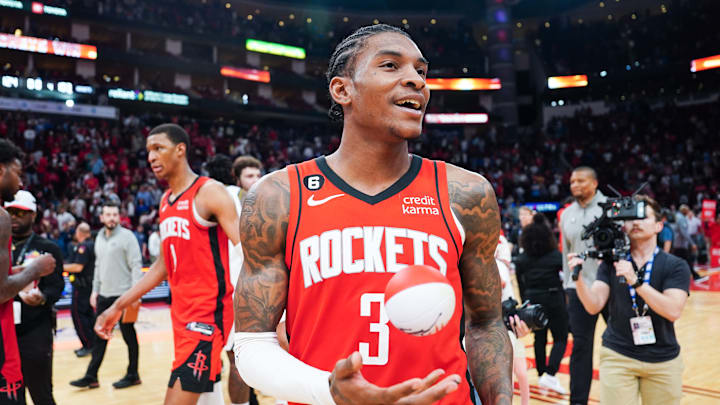On Saturday evening, the Houston Rockets made the much-anticipated announcement that they would be shutting down guard Kevin Porter Jr. from Sunday's season-finale against the Washington Wizards. Porter Jr. was slated to hit the likely bonus marker of roughly $2.4 million for having played in 60 games during the 2022-23 season.
Rockets guard Kevin Porter Jr. listed as out (sore right knee.) He will play in 59 games, one shy of the 60 tomake next season's bonus for games played considered a "likely" bonus. It does not impact his salary this season or next but increases Rockets cap room this summer.
— Jonathan Feigen (@Jonathan_Feigen) April 8, 2023
The move was beneficial for the Rockets, as it simply gave them the extra $2.4 million to play with in cap space. This prompted many to speculate whether NBA commissioner Adam Silver and his office would open an investigation into the Rockets' cap maneuver, which will surely not be happening.
Why the league won't be investigating Rockets' cap maneuver involving Kevin Porter Jr.'s contract
For one, there's essentially no reason for the league to look into this, as Porter Jr. isn't being short-changed. The 22-year-old Porter will be receiving his same full salary, as his current pay is based on his rookie first-round deal, so his contract extension doesn't kick in until the 2023-24 season.
Also, this isn't the first time that a team has included an incentive marker that they have full control over. In fact, this isn't even the Rockets' first time including such an incentive, as they did something eerily similar with the construction of Clint Capela's contract extension in 2018. The difference being Capela's bonuses were based on free throw percentage, reaching the Western Conference Finals, and defensive rebounding rate.
The Rockets also did the same thing with Nene's deal in 2019. If Nene played in 10 games and his team won 52+ games, he would earn $2.435 million. If he played in at least 25 games and his team won 52+ games, he was slated to earn an additional $2.5 million. Furthermore, if he were to have played in at least 40 games and the team won 52+ games, he was going to make an additional $2.5 million. In total, the incentives equaled $7.435 million.
This deal was ultimately rejected, but only because the original contract had him counting as $10 million in outgoing salary but would only count as $2.6 million in incoming salary, not because of any of the framework tied to his "likely bonuses."
It's smart business to give a player a "likely bonus", knowing that you hold abundant control over whether the bonus would be paid out. This is especially the case as it pertains to a games-played bonus, as the team has the ability to shut players down at will.
Players surely know this is a possibility when they sign the deal, and likely aren't banking on said bonus (at least if they have a smart agent). The Rockets also aren't the only team that does this.
If this was an issue, the contract wouldn't have been agreed upon at the time, as the players association keeps a watchful eye for such things.
So rest assured, Silver and the league office will surely not be popping the hood and probing into the Rockets' affairs, as it pertains to Porter Jr.'s bonuses.
